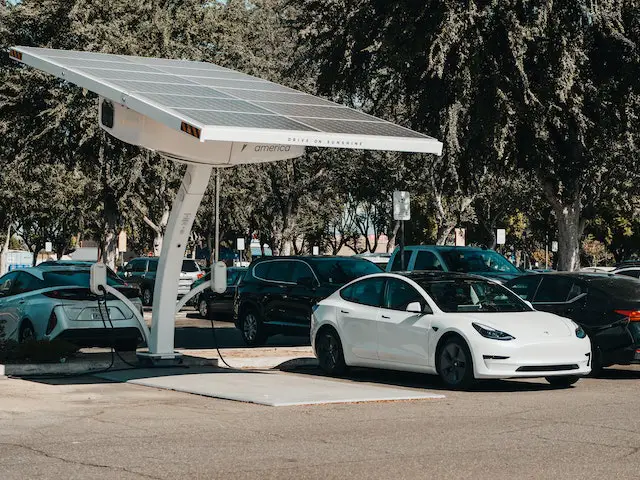
Amidst the defining era of our history, the global community grapples with the imperative challenge of combating climate change and embracing sustainability as a prevailing way of life.
In this transformative expedition, a notable focal point emerges—the transition from conventional gasoline-powered vehicles to groundbreaking electric vehicles (EVs).
Within these pages, we embark on an expedition into a hypothetical realm where each automobile thrives on electrifying energy, uncovering an array of prospective merits, inevitable impediments, and the profound ramifications it would bestow upon our civilization and environment.
As we delve into this thought-provoking scenario, a brighter, greener future beckons us to rise to the occasion, leading us to construct a more sustainable and promising morrow.
The Current Landscape of Transportation
In the contemporary panorama of transportation, fossil fuel-powered vehicles hold dominion over the roads, resulting in a substantial release of greenhouse gases and air pollutants.
This urgency prompts us to address carbon emissions and explore viable alternatives, birthing a future that embraces cleaner and more sustainable transportation options.
- Read also: Who Invented The Cars? The history Of How Cars Were Invented
- Read also: What Happens If We Ignore Climate Change
The Rise of Electric Vehicles
EVs have gained significant traction as a promising countermeasure against climate change and emissions reduction.
Pioneering strides in battery technology and remarkable advancements in charging infrastructure have played pivotal roles in propelling the global adoption of EVs.
With increasing recognition of the environmental merits and long-term sustainability of electric vehicles, their prominence on the thoroughfares ascends, catalyzing a greener and cleaner transportation landscape.
Advantages of an All-Electric Car Fleet
Embracing an all-electric car fleet entails an array of compelling advantages.
Foremost, this transition assumes a pivotal role in curtailing greenhouse gas emissions, a potent weapon in combating the pressing menace of climate change.
Additionally, electric vehicles offer lower operating costs and necessitate reduced maintenance compared to their traditional internal combustion engine counterparts.
This cost-effectiveness and diminished maintenance burden make EVs an appealing prospect for both individuals and fleet operators, fostering a more sustainable and economically sound transportation system.
Challenges and Obstacles
Notwithstanding the promising vision of an all-electric car fleet, obstacles and challenges loom on the horizon.
Notably, the relatively high cost of electric vehicles may deter widespread adoption.
Accelerating the transition necessitates a collaborative effort between governments and industries to render EVs more affordable and accessible to the masses.
Moreover, addressing the limited range of certain electric vehicles and extending charging infrastructure to remote areas are critical steps in ensuring the practicability and convenience of electric transportation.
By investing in charging networks and promoting technological advancements, we lay the foundation for a seamless journey toward an all-electric future—a journey that renders invaluable benefits to our environment and society at large.

The Impact on the Environment
The transformation to all-electric cars yields a momentous environmental impact.
This transition allows us to substantially mitigate harmful air pollutants and greenhouse gas emissions, bestowing upon us cleaner air and a healthier environment.
This paradigm shift plays a vital role in combating the adverse consequences of climate change, safeguarding public health for posterity.
Embracing electric vehicles transcends mere technological advancement—it is a profound stride toward a sustainable and greener world for current and future generations alike.
The Transformation of the Energy Sector
Transmuting into an all-electric car fleet engenders a metamorphosis in the energy sector.
The augmented demand for electricity necessitates the integration of renewable energy sources and energy storage solutions to ensure a dependable and sustainable power supply.
Embracing this change not only forges a path to greener transportation but also propels us toward an era where our energy needs are met with greater environmental awareness and responsibility.
By harnessing the potential of renewables, we establish a symbiotic relationship between electric vehicles and clean energy, advancing toward a more sustainable and eco-conscious world.
Infrastructure Development and Investment
Envisioning a future with widespread electric vehicle adoption illuminates the critical roles of infrastructure development and investment.
To facilitate this transformation, substantial investments in charging infrastructure are indispensable.
The endeavor demands a collaborative effort between governments, private enterprises, and communities to erect a comprehensive and readily accessible charging network.
By establishing a robust infrastructure, electric vehicle owners can traverse the thoroughfares confidently, free from range anxiety.
Consequently, such a move promotes the adoption of cleaner and more sustainable transportation alternatives.
This investment not only lays the groundwork for a greener future but also spurs economic growth and generates job opportunities in the burgeoning electric vehicle industry.

Electric Cars and the Automotive Industry
The shift toward an all-electric car fleet holds the potential to revolutionize the automotive industry as we know it.
Established automakers face the challenge of adapting their production lines to cater to the growing demand for electric vehicles.
This metamorphosis entails reimagining supply chains, investing in battery technology, and conceiving innovative EV designs to maintain competitiveness in a rapidly evolving market.
Simultaneously, the ascendancy of electric vehicles paves the way for emerging players in the EV landscape, introducing novel ideas and cutting-edge technologies.
This transformation surpasses a mere propulsion system adoption—it constitutes a paradigm shift that shapes the future of transportation, sustainability, and consumer preferences.
The automotive industry’s response to this shift will underscore its resilience and relevance in the age of electrified mobility.
The Electric Car Ownership Experience
The most immediate benefit manifests as a substantial reduction in fuel costs, allowing owners to save funds while contributing to a greener future.
As they glide along the roads, electric car owners savor the bliss of quieter rides, free from the rumbling sounds of conventional internal combustion engines.
This newfound tranquility imparts an extra touch of serenity to every journey, heightening the driving experience. Furthermore, electric car owners revel in the profound satisfaction of actively contributing to environmental conservation.
By opting for electric vehicles, they become integral to a collective endeavor to combat climate change and preserve the earth’s invaluable natural resources.
This sense of purpose and eco-consciousness enriches their driving experience, rendering electric car ownership a genuinely rewarding choice.
Economic Implications and Job Opportunities
The transition toward an all-electric car fleet would invariably engender a transformation in the automotive industry.
Established automakers confront the challenge of adapting their production lines and business models to cater to the burgeoning demand for electric vehicles.
Conversely, the rise of electric mobility opens doors for new entrants into the EV market, fostering innovation and competition.
As consumer preferences evolve, and environmental concerns drive demand for sustainable transportation, the automotive landscape undergoes a dynamic and thrilling evolution.
Embracing this change and investing in electric vehicle technologies not only lays the groundwork for a greener future but also positions companies at the forefront of an ever-advancing industry.

Government Policies and Incentives
Governments wield substantial influence in propelling the transition toward electric vehicles through supportive policies, incentives, and regulations.
By offering subsidies, and tax credits, and setting emission reduction targets, they stimulate both consumers and industries to wholeheartedly embrace electric mobility.
Such measures not only expedite the adoption of EVs but also foster a sustainable and cleaner transportation ecosystem.
By actively collaborating with stakeholders and advocating greener alternatives, governments shape a future that prioritizes environmental conservation and reduces our carbon footprint.
The Global Perspective: A Unified Effort
At the core of addressing climate change and embracing electric vehicles lies the imperative for a united global effort.
By fostering international collaboration, sharing vital research insights, and exchanging invaluable information, we accelerate our journey toward a more sustainable transportation future.
Collective action as a global community empowers us to make a meaningful impact on our planet’s health, securing a cleaner, greener world for future generations.
Addressing Range Anxiety and Charging Infrastructure
Conquering range anxiety, a common concern among potential EV buyers necessitates a two-pronged approach: expanding charging infrastructure and advancing battery technology.
A well-developed charging network and more efficient batteries instill confidence in electric vehicles, rendering them a viable and enticing option for a broader audience.
Sustainable Development and Urban Planning
As we embrace electrifying the transportation sector, urban planning, and sustainable development bear significant consequences.
Cities must prioritize pedestrian-friendly infrastructure and invest in efficient public transportation systems.
This transition engenders opportunities to create more eco-friendly and livable urban spaces, inspiring people to embrace cleaner and greener mobility options while fostering sustainable development for the future.

- Read also: What Would Happen If Everyone Become Rich
- Read also: Here’s How to Prepare for a Cyber Attack
Conclusion
The prospect of an all-electric car fleet signifies a remarkable transformation in the realm of sustainable transportation.
By embracing electric vehicles, we not only curtail harmful emissions and improve air quality but also spearhead technological advancement.
Electric vehicles signify a momentous stride toward combating climate change and cultivating a cleaner, greener world for generations to come.
This inspiring vision beckons us to unite in collective effort and dedication, charting a path to a more sustainable and environmentally-conscious future.
FAQs
Electric vehicles are typically more expensive upfront, but they offer lower operating costs and potential savings on fuel expenses in the long run.
The range of electric vehicles varies based on the model and battery capacity. Modern EVs can typically travel 200 to 300 miles on a single charge.
Range anxiety refers to the fear of running out of charge before reaching a charging station. It can be addressed through the expansion of charging infrastructure and improvements in battery technology.
Governments can incentivize EV adoption through subsidies, tax credits, emission reduction targets, and investments in charging infrastructure.
Individuals can contribute by choosing electric vehicles, using public transportation, and supporting sustainable policies and initiatives aimed at reducing carbon emissions in the transportation sector.


